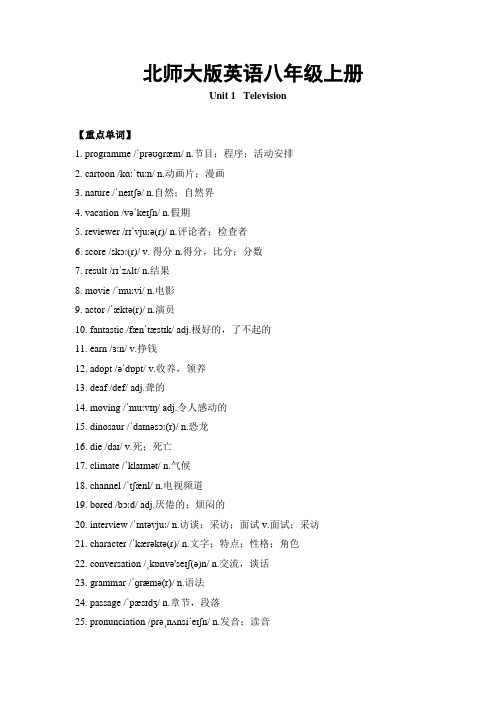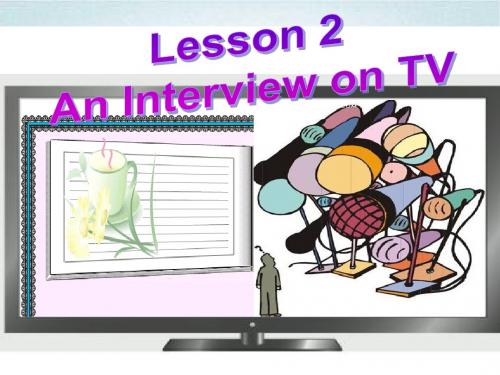【最新】北师大版八年级英语上册Unit 1 Television Lesson 2 An Interview on TV 第1课时精品课件
北师大初中八年级英语上册课件:Unit 1 Television Lesson 2 第1课时

listening writing reading speaking played games watched TV
4. Did she like her teacher?
Yes.
Listening 2
1. Is it the first time for James to learn Chinese in China now?
4._T_i_n_a_&__J_a_m__e_s_ think(s) Chinese writing is difficult.
Listening 1
1. When did Tina come to Beijing? In 2008.
2. Did she know any Chinese before coming to China? No.
2. What are they talking about? A. Their learning experience B. Their language C. Their English learning
Listen and write Tina, James or Tina & James in each blank.
Recite the words of Lesson 2.
long passages Chinese characters
simple conversations Chinese writing
Listening 2
Reason Chinese characters looked interesting.
In the US _e_n_j_o_y_e_d_ Chinese class, __h_e_lp_e_d__ him understand Chinese pinyin, _g_r_a_m__m_a_r_, Learning pronunciation and simple conversations experience In China _le_a_r_n__to__r_e_a_d_ long passages and Chinese characters
北师大版八年级英语上册教案Unit 1 Television—Comshop 第1课时教学设计

精品基础教育教学资料,请参考使用,祝你取得好成绩!Unit 1 Communication Workshop教材分析本课是北师大版《初中英语》八年级上册教材第1单元的Communication Workshop 部分。
本单元的话题为电视节目、语言学习经历、体育与赛事。
在本单元第1—3课学生通过阅读和听力活动进行了相关内容的语言学习和初步应用。
前三个输入课的学习,学生通过阅读,获取了上周电视节目和体育与赛事的相关语言信息;通过听力,学习了对Tina和James的采访,从而了解他们语言学习经历的信息。
在本课,学生要综合使用本单元所获取的有关的词汇和语言信息,以书面形式介绍并评价自己最喜爱电视节目。
此话题贴近学生生活,是学生较为熟悉的话题。
从哪几个方面表达和如何正确运用一般过去时态表达是学生存在困难的地方。
本课的教学设计分为两课时,第一课时学生通过阅读获取与写作相关的语言信息。
引导学生关注文章结构和语言表达,通过小组合作的方式,讨论完善写作提纲。
在第二课时,引导学生进行写作自评和互评,学会欣赏他人作品。
学生根据评价,自己修改文章,完成写作作品。
最后,学生和同伴在写作的基础上,展开关于对喜爱的电视节目的讨论和交流。
教学内容话题:电视节目学习内容:阅读Jack的博客获取有关谈论自己喜爱的节目的信息;阅读:通过使用不同的阅读策略,获取文本主要信息,关注文章结构和目标语言;写作:模仿范文结构,列出提纲,进行写作、评价和修改;口语表达:介绍自己最喜爱的电视节目并评价。
第一课时First Period教学目标在本课学习结束时,学生能够:1. 通过阅读范文,获取有关Jack的最喜爱的电视节目信息;2. 在范文中找出自己写作任务中所需要的内容语言,丰富自己的相关话题的表达语言;3. 分析和归纳范文结构;4. 列出写作提纲。
北师大版八年级英语上册教案:Unit 1 Television—1 Last Week on TV 第1课时

环节
时间安排
教学内容、教师活动
学生活动
设计思想
一步内化对话信息和语言。
Step 5
Post-listening
15
1.After the listening, T asks Ss to work in groups and try to role-playabout their favouriteTV programmes and their reasons.
过程与方法
讨论、探究
情感、
态度与价值观
教育学生喜欢看不同电视节目的人性格是不一样的,要多看新闻,了解国家大事,成为一个视野宽阔的人,热爱生活,热爱大自然。
重点
难点
重点:根据所听文章,获取评论者谈论的电视节目以及他们的态度性语言。
难点:运用所学形容词以及电视节目描述同学们喜欢的电视节目以及原因。
技术
准备
topic.
Listen andfill.
Listen and describe the four students’favourite TV programmesand their reason.
Listen and read.
1.通过第二遍和第三遍听,获取有关电视节目的的细节信息。2.通过描述四个评论者描述的电视节目以及喜好的态度,帮助学生内化信息语言。3.通过第四遍听和朗读,学生模仿对话人物的语言和语音语调语流,进
课题
Unit1Television
Lesson 1 LastWeek on TV
共2课时
第1课时
教学目标
在本课学习结束时,学生能够:
1.辨认并准确说出自己喜欢的电视节目的名称;
2.通过听获取四位评论者谈论的电视节目及对它的情感Fra bibliotek度等细节信息;
初中北师大版英语八年级上册【教学课件】Unit 1 Lesson 1

Example
I watched a football game between France and Germany in the vacation. It was exciting.
北京师范大学出版社 八年级 | 上册
Reading
Look at the photos. Which kinds of TV programs do you see here?
北京师范大学出版社 八年级 | 上册
Read the reviews and complete the table.
Name Channel What was it about? What did the reviewer think?
My Dog Bobby
Movie World
about a man named Dan and his dog
Project
Do you like the programs? Why or why not? Share your opinions on the programs.
北京师范大学出版社 八年级 | 上册
Vocabulary
Find adjectives ending in “-ing” form on page 6 and complete the table. “-ed” form
bored interested excited
“-ing” form
boring interesting
exciting
北京师范大学出版社 八年级 | 上册
Look at the sentences. Which adjective describes a thing and which describes how a person feels?
北师大版英语八年级上册Unit 1 Television重难点知识归纳总结

北师大版英语八年级上册Unit 1 Television【重点单词】1. programme /ˈprəʊɡræm/ n.节目;程序;活动安排2. cartoon /kɑːˈtuːn/ n.动画片;漫画3. nature /ˈneɪtʃə/ n.自然;自然界4. vacation /vəˈkeɪʃn/ n.假期5. reviewer /rɪˈvjuːə(r)/ n.评论者;检查者6. score /skɔː(r)/ v. 得分 n.得分,比分;分数7. result /rɪˈzʌlt/ n.结果8. movie /ˈmuːvi/ n.电影9. actor /ˈæktə(r)/ n.演员10. fantastic /fænˈtæstɪk/ adj.极好的,了不起的11. earn /ɜːn/ v.挣钱12. adopt /əˈdɒpt/ v.收养,领养13. deaf /def/ adj.聋的14. moving /ˈmuːvɪŋ/ adj.令人感动的15. dinosaur /ˈdaɪnəsɔː(r)/ n.恐龙16. die /daɪ/ v.死;死亡17. climate /ˈklaɪmət/ n.气候18. channel /ˈtʃænl/ n.电视频道19. bored /bɔːd/ adj.厌倦的;烦闷的20. interview /ˈɪntəvjuː/ n.访谈;采访;面试 v.面试;采访21. character /ˈkærəktə(r)/ n.文字;特点;性格;角色22. conversation /ˌkɒnvə'seɪʃ(ə)n/ n.交流,谈话23. grammar /ˈɡræmə(r)/ n.语法24. passage /ˈpæsɪdʒ/ n.章节,段落25. pronunciation /prəˌnʌnsiˈeɪʃn/ n.发音;读音26. vocabulary /vəˈkæbjələri/ n.词汇,词汇量27. quite /kwaɪt/ adv.相当28. rule /ruːl/ n.规则29. experience /ɪkˈspɪərɪəns/ n.经验;实践 v.经历;体验30. carefully /'keəfəlɪ/ adv.仔细地31. field /fiːld/ n.运动场;田地32. extremely /ɪkˈstriːmli/ adv.极其;非常33. fit /fɪt/ adj.健壮的,健康的 v.适合;合身34. agree /əˈɡriː/ v.同意;赞成35. certainly /ˈsəːt(ə)nli/ adv.当然;确定36. pass /pɑːs/ v.传球;传递37. goal /ɡəʊl/ n.射门,进球得分;目标38. kick /kɪk/ n., v.踢39. basket /ˈbɑːskɪt/ n.投篮得分;篮子40. foul /faʊl/ n., v.犯规41. kid /kɪd/ v.开玩笑 n.小孩42. call /kɔːl/ n.(裁判员的)判决;电话 v.打电话;把……叫做43. terrible /ˈterəbl/ adj.非常讨厌的;可怕的44. shame /ʃeɪm/ n.令人遗憾的事;羞耻,羞愧45. should /ʃəd/ v.应该,应当46. complain /kəmˈpleɪn/ v.抱怨;埋怨47. hit /hɪt/ v.击(球) n.打;击48. court /kɔːt/ n.球场;法庭49. form /fɔːm/ n.表现状态;形式;表格 v.组成;产生;组织50. win /wɪn/ v.获胜,赢51. break /breɪk/ v.弄破,(使)破;中断 n.间歇52. prize /praɪz/ n.奖;奖金53. lose /luːz/ v.遗失,丢失54. fall /fɔːl/ v.跌倒;落下 n.落下;秋天55. magic /ˈmædʒɪk/ n.魔法;魔术 adj.神奇的;有魔力的56. tortoise /ˈtɔ:təs/ n.乌龟57. deer /dɪə(r)/ n.鹿58. sky /skaɪ/ n.天空59. whale /weɪl/ n.鲸60. ocean /ˈəʊʃn/ n.大海,海洋61. photographer /fəˈtɒɡrəfə(r)/ n.拍照者,摄影师62. cameraman /ˈkæmrəmæn/ n.摄影师63. host /həʊst/ n.主持人;主人;主办地 v.主持64. explain /ɪk'spleɪn/ v.解释;说明65. habit /ˈhæbɪt/ n.习惯66. scenery /ˈsiːnəri/ n.风景,景色67. explanation /ˌekspləˈneɪʃn/ n.说明;解释68. continue /kənˈtɪnjuː/ v.持续;继续【重点短语】1. take notes 记笔记2. score a goal 进了一个球,得一分3. make a basket 投中一球4. in top form 状态很好5. run after 追逐6. in the vacation 在假期中7. the first half 上半场8. the second half 下半场9. go to university 上大学10. play games 玩游戏11. complain about 投诉,抱怨12. make a goal 得一分13. learn about 了解;学习14. fall asleep 入睡;睡着15. give up 放弃16. on weekends 在周末17. turn on 打开18. get close to 接近19. every part of the world 世界各地【重点句型】1. What a shame!真遗憾!2. The English team tried hard but they didn’t score.英国队很努力了,但他们没有得分。
北师大版八年级英语上册课件:Unit 1 Television Lesson 2 An Interview on TV 第1课时

we need to learn
The four skills of learning English are
1. Why do Tina and James live in Beijing?
They are learning Chinese.
Learning experience
Recite the words of Lesson 2.
No.
2. When did James start learning Chinese?
He started learning Chinese at university in the US.
What is difficult to James?
Chinese pinyin long passages grammar pronunciation Chinese characters
Listening 1
1. When did Tina come to Beijing? In 2008. 2. Did she know any Chinese before coming to China? No. 3. What did she do in her Chinese class?
2. What are they talking about? A. Their learning experience B. Their language C. Their English learning
Listen and write Tina, James or Tina & James in each blank.
simple conversations
北师大版八年级英语上册课件:Unit 1 Television Lesson 2 第1课时
Listen and write Tina, James or Tina & James in each blank.
4._T_i_n_a_&__J_a_m__e_s_ think(s) Chinese writing is difficult.
Listening 1
1. When did Tina come to Beijing? In 2008.
2. Did she know any Chinese before coming to China? No.
If we want to learn a language, we need to learn
The four skills of learning English are
1. Why do Tina and James live in Beijing?
They are learning Chinese.
No.
2. When did James start learning Chinese?
He started learning Chinese at university in the US.
3. What is difficult to James?
Chinese pinyin grammar pronunciation
Recite the words of Lesson 2.
3. What did she do in her Chinese class?
新北师大版八年级英语上册Unit 1 Television Communication Workshop 第1课时精品课件
His reasons:
1. It shows animals from every part of the world.
His reasons:
2. You can see how animals live in the wild.
His reasons:
3. The host explains the animals’ habbits clearly.
Read the second paragraph and answer the questions:
Q1: What animals does Jack have at home? Q2: What does Jack like about Animal World?
1. Tortoises,birds and fish. • 2. He can see how animals live in the wild and the host explains the animals’ habits clearly.
soap opera
game show
Work in groups of four to talk about other TV programmes that you know.
Please read the passage and answer the question:
北师大版英语八年级上册听力原文及翻译
Unit 1 TelevisionLesson 2 Exercise 2 & 3Narrator: Tina and James live in Beijing. They are learning Chinese. We asked them about their experience.蒂娜和詹姆斯住在北京。
他们正在学汉语。
我们问了他们有关的学习经历。
Interviewer: Tina, when did you come to Beijing?蒂娜,你什么时候来的北京?Tina: I came to Beijing in 2008. I studied in a language school.我2008年来的北京,在一家语言学校学习。
Interviewer: Did you know any Chinese before you came to China?在你来中国之前,你对汉语有任何了解?Tina: No, I didn’t know a word of Chinese.没有,我连一个汉语字都不知道。
Interviewer: So, what did you do in your Chinese class?所以,在你的汉语课上做过什么?Tina: Oh, we did lots of listening, speaking and writing exercises but sometimes we played games too. And we watched interesting TV programmes. My teacher was pretty good.哦,我们做了大量的听力、口语和写作练习,有时也玩游戏。
我们也看有意思的电视节目。
我的老师很不错。
Interviewer: So James, why did YOU want to learn Chinese?所以詹姆斯,你为什么想学汉语?James: Well, I was about ten years old and I saw a Chinese book at my cousin’s house. It was the first time I saw Chinese characters. They looked so interesting.嗯,我大概十岁的时候,在我表兄弟家里看到过一本汉语书。
北师大版八年级英语上册课件:Unit 1 Television Lesson 2 An Interview on TV 第1课时6
simple conversations Chinese writing
Listening 2
Reason Chinese characters looked interesting.
In the US _e_n_j_o_y_e_d_ Chinese class, __h_e_lp_e_d__ him understand Chinese pinyin, _g_r_a_m__m_a_r_, Learning pronunciation and simple conversations experience In China _le_a_r_n__to__r_e_a_d_ long passages and Chinese characters
3. What did she do in her Chinese class?
listening writing reading speaking played games watched TV
4. Did she like her teacher?
Yes.
Listening 2
1. Is it the first time for James to learn Chinese in China now?
No.
2. When did James start learning Chinese?
He started learning Chinese at university in the US.
3. What is difficult to James?
Chinese pinyin grammar pronunciation
- 1、下载文档前请自行甄别文档内容的完整性,平台不提供额外的编辑、内容补充、找答案等附加服务。
- 2、"仅部分预览"的文档,不可在线预览部分如存在完整性等问题,可反馈申请退款(可完整预览的文档不适用该条件!)。
- 3、如文档侵犯您的权益,请联系客服反馈,我们会尽快为您处理(人工客服工作时间:9:00-18:30)。
simple conversations
Cபைடு நூலகம்inese writing
Listening 2
Reason
Chinese characters looked interesting.
In the US enjoyed Chinese class, ________ helped him ________ grammar understand Chinese pinyin, _________, pronunciation and simple conversations In China learn to read long passages and ____________ Chinese characters
Learning experience
Recite the words of Lesson 2.
2. What are they talking about? A. Their learning experience B. Their language C. Their English learning
Listen and write Tina, James or Tina & James in each blank.
1. _____ Tina didn’t speak any Chinese before 2008. Tina learned some Chinese from 2. _____ games and TV. 3. James ______ began learning Chinese at university. 4._____________ Tina & James think(s) Chinese writing is difficult.
If we want to learn a language,
we need to learn
The four skills of learning English are
1. Why do Tina and James live in Beijing?
They are learning Chinese.
listening writing reading speaking played games watched TV
4. Did she like her teacher? Yes.
Listening 2
1. Is it the first time for James to learn Chinese in China now?
Listening 1
1. When did Tina come to Beijing? In 2008. 2. Did she know any Chinese before coming to China? No. 3. What did she do in her Chinese class?
No.
2. When did James start learning Chinese?
He started learning Chinese at university in the US.
3. What is difficult to James?
Chinese pinyin long passages grammar pronunciation Chinese characters
